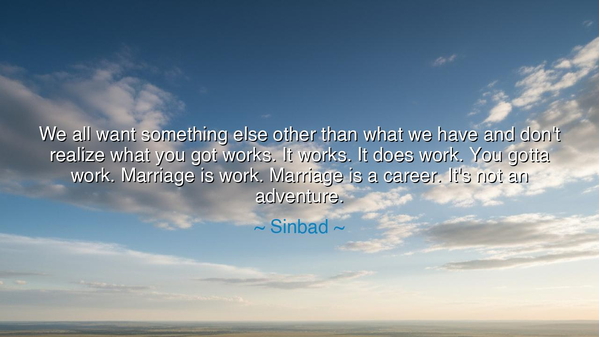
We all want something else other than what we have and don't
We all want something else other than what we have and don't realize what you got works. It works. It does work. You gotta work. Marriage is work. Marriage is a career. It's not an adventure.






"We all want something else other than what we have and don't realize what you got works. It works. It does work. You gotta work. Marriage is work. Marriage is a career. It's not an adventure." These words from Sinbad reveal a timeless truth about the nature of commitment and relationship—particularly in the sacred union of marriage. In a world where immediate gratification and fantasy often overshadow reality, Sinbad's statement challenges us to reconsider our expectations. Marriage, he says, is not a fleeting moment of adventure or a perfect dream to be chased, but a career—a journey that requires consistent effort, dedication, and the wisdom to appreciate what we have, rather than yearning for something that seems more exciting or glamorous.
In the ancient world, the great philosophers knew well that lasting success in any endeavor required more than fleeting passion. Aristotle, in his treatise on ethics, spoke of virtue as the habit of doing what is right consistently, over time. He understood that true happiness—whether in relationships, careers, or life—does not come from avoiding work, but from engaging in it fully and with purpose. Marriage, according to Aristotle, would be no different: it is not the grand gestures or romantic ideals that sustain a relationship, but the steady commitment to mutual respect, care, and love over the long term. Sinbad’s words, in essence, mirror this ancient wisdom, teaching us that marriage is not something that thrives on fantasy, but something that flourishes through hard work, much like any meaningful career.
Consider the example of Odysseus, the legendary hero of Homer's Odyssey. His journey is filled with temptation, distraction, and countless adventures that could have led him away from his beloved wife, Penelope, but instead, he remains faithful, knowing that what he has with her is not a mere adventure but the steadfast bond of marriage. Through years of hardship and separation, his return to Ithaca is not the end of a thrilling story but the beginning of another chapter in a life built on work—the work of rebuilding his home, his kingdom, and his relationship. Just as Odysseus worked to rebuild his life, Sinbad's statement encourages us to see that marriage is about maintaining and nurturing a relationship through effort—not chasing endless adventures.
In the more recent past, consider the relationship of Frida Kahlo and Diego Rivera, two great artists whose love was marked by passion, conflict, and deep mutual respect. Their marriage was not one of constant romantic adventure but one of work—in their personal lives and their shared artistic pursuits. Despite their differences, Kahlo and Rivera both understood that the success of their union lay in their dedication to each other and their work together, even in the face of trials and betrayal. Their love was a journey that required continual effort, compromise, and the willingness to accept the imperfections in one another. They were career partners as much as they were life partners, and this dedication to the work of marriage allowed them to create not only art but a lasting bond that transcended their struggles.
Sinbad's words also highlight a crucial aspect of human nature—our tendency to look for what we don't have and overlook the value of what we do. This longing for something more glamorous or exciting is not unique to marriage but extends to every area of life. Whether in career or relationships, we often desire something that seems unattainable, and in doing so, we fail to appreciate the potential of what we already have. This discontentment can be corrosive, preventing us from investing the necessary effort to make what we already possess thrive. Marriage, like any successful career, requires that we nurture it with the attention, respect, and effort it deserves, rather than constantly searching for the next big thing that promises to bring more joy or excitement.
The lesson, dear ones, is clear: marriage is not a fleeting adventure, but a lifelong commitment—a career that requires constant attention, dedication, and work. Sinbad’s insight teaches us to appreciate the value of what we have, rather than being distracted by what we don’t. It is easy to get caught in the illusion of something better, something more exciting, but true fulfillment comes from committing ourselves fully to the life we have chosen to build. Love is work, and it is in this work that we find the deepest joy—not in the fleeting excitement of a new beginning, but in the steady, persistent effort to nurture, grow, and appreciate the life we have.
As you reflect on this in your own life, ask yourself: Am I willing to do the work of love? Am I willing to see marriage as a career, something that requires daily effort, understanding, and growth? It is not the grand gestures that define the strength of a marriage but the small, daily acts of care and commitment that build a foundation of lasting love. Embrace the work, for in it, you will discover the true rewards of a life well-lived with another. Marriage, like any career, requires both partners to invest in the long-term success of the relationship, and it is through this commitment that the greatest joy will be found.






AAdministratorAdministrator
Welcome, honored guests. Please leave a comment, we will respond soon